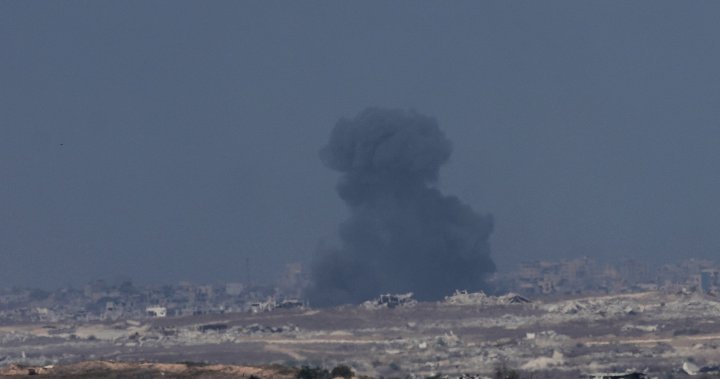As the sun sets over Doha, diplomatic efforts intensify behind the ornate doors of Qatar’s Ministry of Foreign Affairs. Meanwhile, in Gaza, 38 more civilians lie dead after yesterday’s airstrikes hit a displacement camp near Khan Younis. The juxtaposition couldn’t be more stark – polished negotiation tables in air-conditioned rooms versus the blood-soaked rubble where children’s backpacks lay scattered.
“We’re working around the clock to bridge the gaps,” says Qatar’s Prime Minister Sheikh Mohammed bin Abdulrahman Al Thani, who has emerged as a crucial mediator between Hamas and Israeli officials. Having spent sixteen hours with both sides yesterday, the exhaustion shows on his face, but determination remains. “Every day without progress means more lives lost.“
The current round of talks in Doha represents the most promising opportunity for a breakthrough since May, when previous negotiations collapsed amid mutual accusations. US Secretary of State Antony Blinken arrived yesterday, his seventh trip to the region since October, signaling Washington’s renewed urgency to secure an agreement.
According to United Nations data, the death toll in Gaza has now exceeded 38,000, with more than 87,000 wounded and nearly 1.9 million people displaced – almost the entire population of the territory. The humanitarian situation has deteriorated to catastrophic levels, with the World Food Programme reporting that famine conditions now affect northern Gaza districts.
“My three children haven’t eaten anything but rice for two weeks,” says Amal Riyad, a mother sheltering in Deir al-Balah whom I interviewed via secure messaging. “We drink contaminated water knowing it will make us sick, but there’s no choice. The ceasefire talks mean nothing when you’re watching your children waste away.“
The current proposal on the table involves a three-phase plan: an initial six-week cessation of hostilities, exchange of some hostages and Palestinian prisoners, followed by withdrawal of Israeli forces from populated areas. The most contentious issues remain Hamas’s demand for a permanent end to hostilities and Israel’s insistence on maintaining military presence along the Philadelphi Corridor bordering Egypt.
Egyptian intelligence officials, speaking on condition of anonymity, revealed that the gap between positions has narrowed considerably on prisoner exchange ratios – now agreeing on approximately 15 Palestinian prisoners for each Israeli hostage. However, the question of which prisoners would be included remains divisive, with Israel rejecting the release of those convicted of serious attacks.
“We’ve learned from past mistakes,” an Israeli negotiator told me privately after yesterday’s session. “The 2011 Shalit deal resulted in the release of individuals who later participated in the October 7 attacks. This time, security considerations must take precedence.“
Hamas officials counter that Israel’s position masks its true intention of indefinitely controlling Gaza. “Netanyahu needs this war,” says Bassem Naim, a senior Hamas political official speaking from Qatar. “Every day the conflict continues strengthens his coalition with far-right partners who openly call for permanent occupation.”
The economic toll continues mounting on both sides. The Israel-Gaza conflict has cost Israel approximately 17% of its GDP, according to Israeli Finance Ministry estimates – around $57 billion in military expenditures and lost economic activity. In Gaza, the World Bank estimates physical damage at $18.5 billion, with economic recovery potentially taking decades.
On the streets of Tel Aviv, where air raid sirens have become less frequent, public opinion remains divided. Recent polling by the Israel Democracy Institute shows 51% of Israelis now favor a deal that would secure hostage releases even if it means compromising on security demands – a significant shift from January when the figure stood at 38%.
“My nephew has been held since October 7,” says Dalia Mizrahi, participating in weekly hostage family protests. “I don’t care about politics anymore. I just want him home before his next birthday. He’s turning 23 next month, if he’s still alive.”
The human dimension extends beyond statistics. Medical teams report unprecedented psychological trauma among Gaza’s children, with UNICEF documenting that nearly every child in Gaza now exhibits signs of severe distress, including nightmares, bedwetting, and aggressive behavior.
Dr. Mahmoud Shalabi, Medical Aid for Palestinians’ senior program manager, described treating children with “thousand-yard stares” – the vacant expression associated with combat veterans. “These kids haven’t just lost homes; they’ve lost their childhood, their sense of safety, their belief in a future.”
As negotiations continue today, both delegations face mounting pressure. The Biden administration, concerned about regional escalation and domestic political implications heading into November elections, has deployed CIA Director William Burns to join the talks – an unusual step reflecting the stakes involved.
Qatar’s unique position as host to Hamas’s political office while maintaining relations with both Israel and the United States has proven invaluable, though mediators appear increasingly frustrated. “We cannot want peace more than the parties themselves,” one Qatari diplomat remarked after yesterday’s session ended without breakthrough.
Whether these talks yield the desperately needed ceasefire depends on political calculations happening thousands of miles from Gaza’s suffering. For now, as negotiators exchange proposals, Gazans exchange burial shrouds, and the world watches, hoping this diplomatic dance finally produces more than promises.






